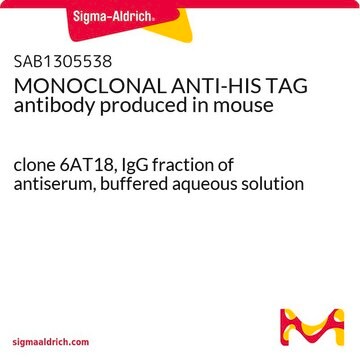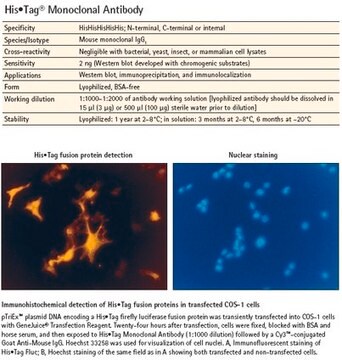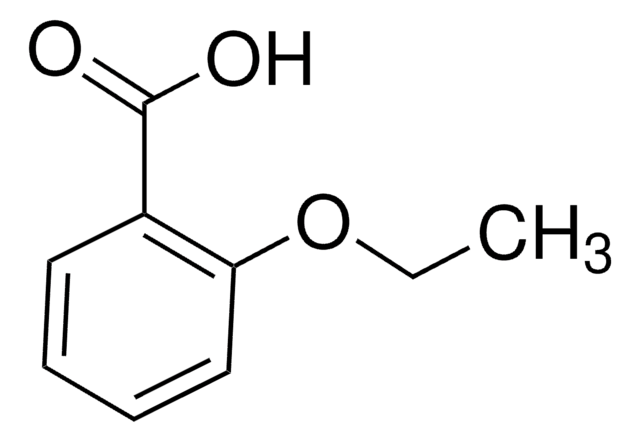SAB1306082
ANTI-HIS TAG antibody produced in rabbit
purified immunoglobulin, buffered aqueous solution
Synonym(s):
Rabbit anti-hexa histidine tag
Sign Into View Organizational & Contract Pricing
All Photos(1)
About This Item
UNSPSC Code:
12352203
NACRES:
NA.43
Recommended Products
biological source
rabbit
Quality Level
antibody form
purified immunoglobulin
antibody product type
primary antibodies
clone
polyclonal
form
buffered aqueous solution
technique(s)
western blot: 1:1000
shipped in
wet ice
storage temp.
−20°C
target post-translational modification
unmodified
General description
Histidine has a strong association with immobilized metal ion matrices. This is because the imidazole ring has electron donor groups that form coordination bonds with the transition metal that is immobilized. Hexahistidine tag (His-tag) consists of four to six histidines that are fused genetically. It is mainly used to purify proteins by immobilized metal-ion affinity chromatography (IMAC). His-tags are added at the amino or carboxy termini of proteins.
Physical form
Supplied in PBS with 0.09% (W/V) sodium azide
Disclaimer
Unless otherwise stated in our catalog or other company documentation accompanying the product(s), our products are intended for research use only and are not to be used for any other purpose, which includes but is not limited to, unauthorized commercial uses, in vitro diagnostic uses, ex vivo or in vivo therapeutic uses or any type of consumption or application to humans or animals.
Not finding the right product?
Try our Product Selector Tool.
Storage Class Code
10 - Combustible liquids
Flash Point(F)
Not applicable
Flash Point(C)
Not applicable
Certificates of Analysis (COA)
Search for Certificates of Analysis (COA) by entering the products Lot/Batch Number. Lot and Batch Numbers can be found on a product’s label following the words ‘Lot’ or ‘Batch’.
Already Own This Product?
Find documentation for the products that you have recently purchased in the Document Library.
Customers Also Viewed
Yuria Jang et al.
International journal of molecular medicine, 53(1) (2023-12-08)
The binding between receptor‑activated nuclear factor‑κB (RANK) and the RANK ligand (RANKL) during osteoclast development is an important target for drugs that treat osteoporosis. The leucine‑rich repeat‑containing G‑protein‑coupled receptor 4 (LGR4) acts as a negative regulator of RANK‑RANKL that suppresses
Shuting Ding et al.
The EMBO journal, 42(6), e111858-e111858 (2022-12-24)
Phytosulfokine (PSK) is a plant pentapeptide hormone that fulfills a wide range of functions. Although PSK has frequently been reported to function in the inverse regulation of growth and defense in response to (hemi)biotrophic pathogens, the mechanisms involved remain largely
Joshua Linnert et al.
Frontiers in cell and developmental biology, 11, 1199069-1199069 (2023-07-10)
The human Usher syndrome (USH) is the most common form of a sensory hereditary ciliopathy characterized by progressive vision and hearing loss. Mutations in the genes ADGRV1 and CIB2 have been associated with two distinct sub-types of USH, namely, USH2C
Tandem Immobilized Metal-Ion Affinity Chromatography/Immunoaffinity Purification of His-tagged Proteins? Evaluation of Two Anti-His-Tag Monoclonal Antibodies
Kristian M.Muller, et al.
Analytical Biochemistry, 54-61 (1998)
[16] Purification of Proteins Using Polyhistidine Affinity Tags
Joshua A, et al.
Methods in Enzymology (2000)
Our team of scientists has experience in all areas of research including Life Science, Material Science, Chemical Synthesis, Chromatography, Analytical and many others.
Contact Technical Service















